FUTURE RESEARCH
9th Edition



The Gender Equity Unit foregrounds SDG 5 (Gender Equality) and SDG 10 (Equal Education). Our mission clearly ensures that we support the University of the Western Cape to promote inclusion of diversity of all genders and gender equity in all spheres of university life, namely student experience, learning and teaching, research and innovation and community engagement within the surrounding communities and in the public domain by working in partnership with civil society organisations and other interested parties.
The Gender Equity Unit conducts weekly workshops led by students for students to raise awareness and consciousness regarding inclusion and diversity relating to gender and sexuality by covering topics like gender-based violence and femicide (GBVF), disability, sexual orientation, gender identity and gender expression, food sovereignty, critical thinking and writing; and edutainment that specifically focuses on gender and sexuality education. The unit has recently partnered with the Office of the Deputy Vice Chancellor for Student Support and Development to conduct ongoing workshops on diversity and inclusion for student leaders including the Student Representative Council, central house committees, faculty student councils and leaders of student formations to ensure that students continue to deepen their consciousness on matters relating to gender equality and gender equity as linked to the promotion of equal education for all on campus. This partnership also ensures period conversations with the broader student community on matters relating to gender and sexuality inclusion and diversity. This is work that is ongoing. The unit further engages with postgraduate students to encourage and support them in their research on gender and sexuality, to ensure that they publish in order to strengthen evidence-based scholarship in the areas of gender and sexuality.
The Gender Equity Unit conducts period gender audits with various departments, faculties, schools and centres each year to ensure that UWC promotes equal education for all people of all genders, races, classes, nationalities and sexualities. The unit has since 2022 been working with the Department of Sports and will
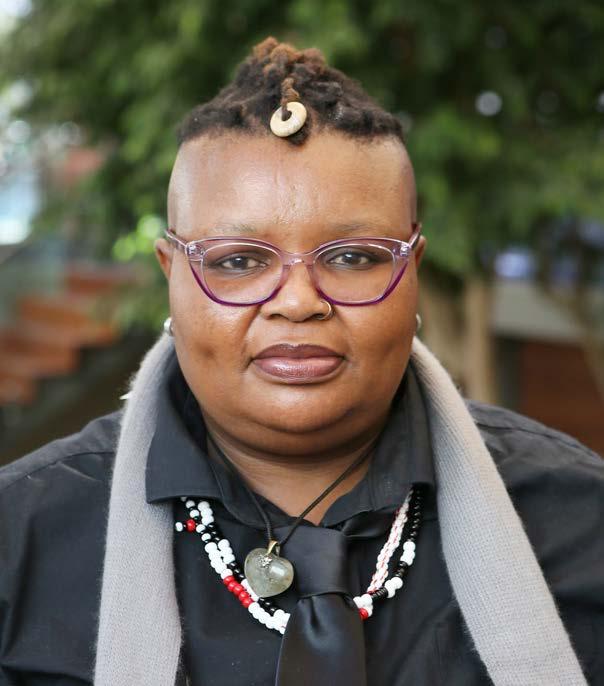
be deepening their work with the gym in 2024. Currently, the unit is pursuing similar initiatives in conjunction with the Faculty of Education. The unit ascribes to a philosophy that ensures it continues to realise a gender equal study and working environment for all. Further to this, the unit has entered into a collaboration with the University of Missouri Centre for Inclusivity and Diversity in the United States to conduct research on the role of gender equity units in higher education to advance gender equality and equal education for all in line with the provisions of SDG 5 and SDG 10.
The Gender Equity Unit, in collaboration with the Department of Social work, is currently conducting research that focuses on the experiences of GBVF amongst deaf women in the City of Cape Town. This work is geared towards ensuring that students of UWC remain conscious about the nuances and importance of preventing GBVF, and understand the intersections of gender and disability through scholarship and research interventions with regard to learning, teaching and engaging with each other and broader communities. In addition, the unit is pursuing research on bullying, including cyberbullying to ensure that the university can be assisted to prevent bullying in the interest of creating an equitable space of learning, teaching and working for people of all genders at UWC.
The Gender Equity Unit has recently put in place a leadership training programme on inclusion and diversity to ensure equality and equity of all genders in leadership structures throughout the university. It is our conviction that we are all equal and that through equity, we can all strive towards a more equal society over time.
“
More than 77% of all of the public oral health services available in the Western Cape, lie in the UWC oral health training platform at the Faculty of Dentistry. Thus, we do play a significant role in promoting health (oral health) and well-being in this province. ”
The University of the Western Cape (UWC) is at the forefront of research and innovation that directly contributes to the achievement of the United Nations’ Sustainable Development Goals (SDGs). Through its diverse portfolio of impactful projects, UWC is making significant strides in addressing some of the world’s most pressing challenges and connecting possibilities for a more equitable and sustainable future.
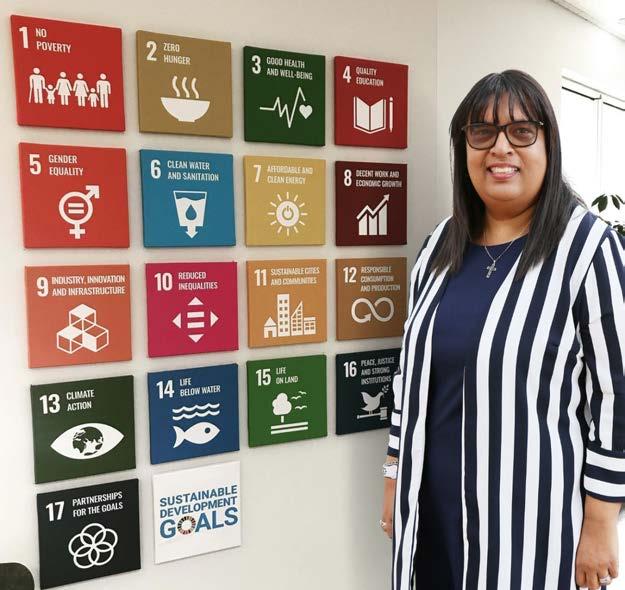
At the heart of UWC’s approach is a deep commitment to interdisciplinary collaboration and community engagement. By fostering partnerships across disciplines and with stakeholders beyond the ivory tower, the university is able to tackle complex, systemic issues in a holistic manner. This collaborative ethos is evident in the work of researchers like Prof Melanie Luckay, whose interdisciplinary project brings together education and occupational therapy students in Sweden and South Africa to support children’s learning and participation in disadvantaged communities - directly contributing to SDGs 4, 10 and 17.
UWC’s research also showcases a strong focus on gender justice and equality, as evidenced by the work of Profs. Sisa Ngabaza and Tamara Shefer. Their pioneering scholarship on sexuality education, young women’s experiences, and decolonial feminist praxis is not only shaping academic discourse, but also empowering marginalized communities and informing policy - crucial steps towards achieving SDG 5.
In addition, the university’s commitment to inclusive development is further exemplified by the research chair in Gender, Transformation and Worldmaking, led by Prof. Karin van Marle. By leveraging the power of law and jurisprudence, this initiative seeks to address persistent inequalities, exemplifying UWC’s holistic approach to realizing the spirit of the SDGs.
Beyond the halls of academia, UWC researchers are also making tangible differences in the lives of people on the ground. The work of Dr Makhaya Malema, who uses leisure education to develop leadership skills in youth with physical disabilities, and the community engagement project led by Maria van Staden, which provides non-formal learning opportunities for girls in rural areas, are
powerful demonstrations of how research can be translated into meaningful, sustainable impactaligning with SDGs 10 and 4 respectively.
The foundation for this remarkable breadth of work is UWC’s steadfast belief in the transformative potential of research and innovation. The research and innovation slogan, “Making Research Count through Connecting Possibilities,” encapsulates its ethos of leveraging scholarly excellence to address real-world challenges and forge new pathways for equitable and inclusive development.
As the world grapples with the sweeping effects of the COVID-19 pandemic, climate change, and persistent social inequalities, the importance of universities like UWC, which are deeply committed to the SDGs, cannot be overstated. By fostering interdisciplinary collaborations, centering marginalized voices, and translating research into tangible change, UWC is demonstrating how the world-class work happening within its walls can have a transformative impact on communities near and far. In an era defined by complex, interconnected challenges, UWC’s research and innovation efforts stand as a beacon of hope, showcasing the power of academia to catalyze positive change and connect possibilities for a more sustainable, equitable future. Through its unwavering dedication to the SDGs, the university is not only making research count, but also charting a course towards a more just, inclusive, and resilient world.

The concept of intersectionality serves as an essential framework to assess how discrimination and oppression of different kinds intersect and lead to compounded effects. In relation to the pressing issues surrounding gender-based violence (GBV) and teenage pregnancy in the socio-cultural landscape of South Africa, adopting an intersectional perspective can facilitate a comprehensive understanding amidst the intricate web of these complex issues. Crenshaw (1989) argues that intersectionality provides a vantage point to recognise where power dynamics intersect, collide and interconnect. In the South African context, the normalisation of teenage pregnancy as rape is indicative of entrenched gender inequality that facilitates violence against women and girls in society and is closely linked to Sustainable Development Goals 5 (gender equality) and 10 (reducing inequalities).
Applying an intersectional approach allows for a deeper understanding of how various factors, including but not limited to race, class, gender identity, and socioeconomic status interact in shaping the experiences associated with GBV and teenage pregnancy.
This methodological framework facilitates the design and development of more holistic solutions aimed at mitigating the root causes associated with these challenges. Accordingly, it is important for policy makers, activists and communities alike to consider this analytical paradigm when developing interventions aimed at creating greater equality while reducing social inequalities related to issues such as violence against women and teenage pregnancy. It is equally important that the university develops an approach to make gender studies and philosophy compulsory. It is the interconnectedness of race, class and gender, as asserted by bell hooks that often grounds and perpetuates white supremacist
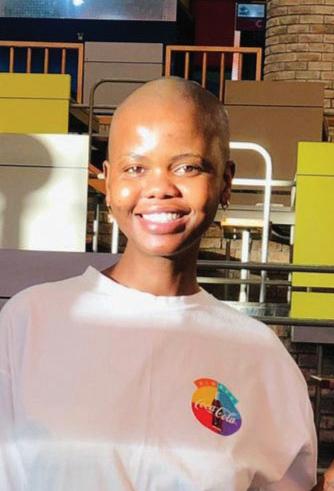
The aim is thus to take a more inclusive and equitable approach to development by incorporating insights from decolonial feminism, particularly from scholars such as Maria Lugones. With regard to Sustainable Development Goals (SDGs) 5 and 10, historical injustices and the challenges posed by dominant power structures must be recognised, challenged and eventually defeated!
The academic contributions of Maria Lugones to the discourse around decolonial feminism focus on understanding the overarching effects of colonialism, imperialism and patriarchy. These factors help to shape systems that promote oppression in society as a whole. When considering their perspective in relation to SDG 10 (reduce inequality), particular attention should be paid not only to the elimination of economic inequalities but also to the underlying structures that perpetuate marginalisation and discrimination against historically marginalised groups such as black people (Steve Biko’s definition).
Foregrounding the experiences and perspectives of marginalised groups—particularly of young women at the University of Western Cape who are often on the protest line addressing the violence that they endure from prevailing power
structures and other underrepresented gender identities — is always instructive and necessary. Thus the decolonial feminism lens offers a comprehensive approach to sustainable progress based on fairness. It argues for substantial participation and leadership of indigenous communities in decisionmaking processes related to development initiatives and gender policies. In this way, they become not only beneficiaries but active participants in shaping their own destiny towards meaningful change. More importantly, in the context of the university, perspectives from decolonial feminism need to ceaselessly be integrated into our approach to SDGs 5 and 10. These approaches can be a means of transforming conventional development paradigms by challenging deeply entrenched narratives while promoting genuine solidarity and empowerment across all sections of society, especially among those who have previously been excluded.
What kind of stories will the children living in informal settlements tell about a South Africa that claims to be democratic and equal yet struggles to fully deliver on its promises to achieve the Sustainable Development Goals and the National Development Plan? What kind of development prospects and opportunities are provided to them by the government?
South Africa’s National Development Plan (NDP) states that “government recognises early childhood development as a fundamental and universal human right to which all young children are equally entitled without discrimination” (Republic of South Africa, 2015:22). Similarly, Sustainable Development Goal 4, target 4.2, calls for all girls and boys to have access to quality early childhood development (ECD) and pre-primary education by 2030 to prepare them for primary education.
That said, there seems to be a huge gap between the government rhetoric of equal universal early learning opportunities and the reality in the country. Nearly 2 million children in South Africa live in informal settlements. Moreover, whenever new informal settlements mushroom, as we saw amid the COVID-19 pandemic, where people lost their jobs and eventually resorted to establishing more informal settlements in worse economic conditions, children were relocated far away from schools, and early childhood centres were almost non-existent. People desperately grabbed land without considering the well-being and developmental needs of their children. Such practices beg the question: How does the government fulfill its mandate of universal access to early education in these informal settlements, as expressed in the NDP and
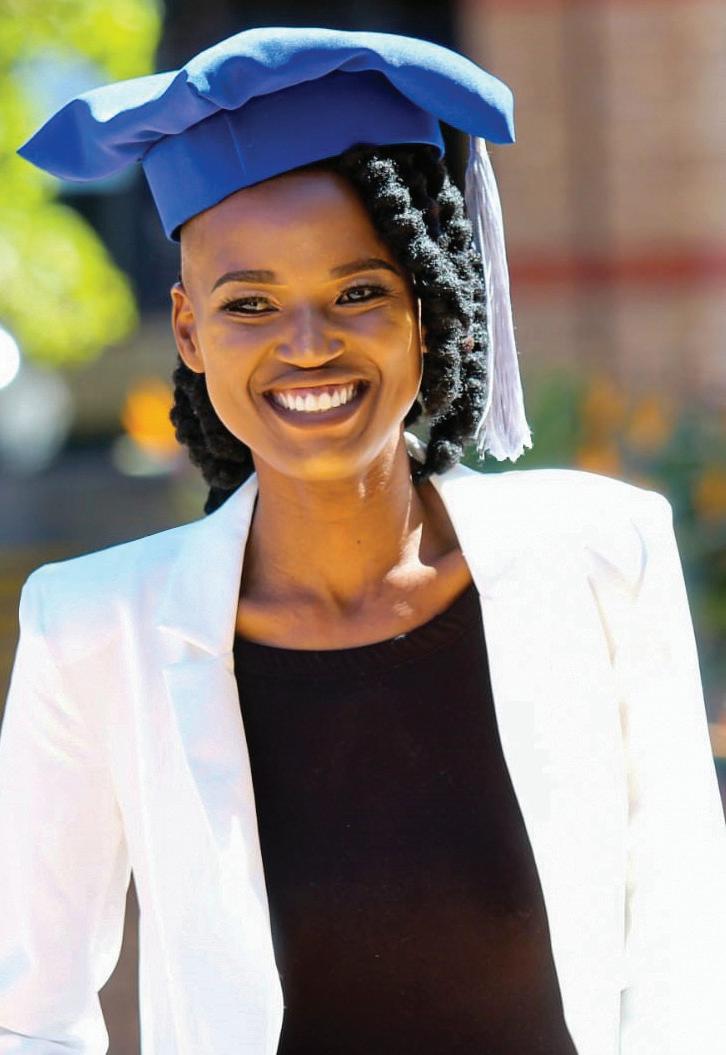
Well, the prevailing ECD policy and the amended Children’s Act of 2005 enable the government to stand at a distance and watch these families scramble to provide whatever early opportunity they may afford. Under the policy, unless these children attend “registered” ECD centres, which are likely outside their neighbourhoods, none of these children will receive direct government financial support towards their learning until they enter the primary school system.
The inevitable stark reality is that informal communities have a proliferation of low-quality, underresourced, unstimulating centres that function as mere babysitting centres.
Children in these centres attend without deriving a meaningful learning experience. Scholars call their experience ‘silent exclusion’; such children may still lag behind children who have had access to high-quality, well-resourced ECD centres. This does not include over 1.3 million children aged three to five who are not receiving early education largely because their parents are unable to pay the fees.
On the other hand, despite the unimpressive outcomes found in formal schooling, the government has gone as far as to pay the fees of children in quintile 1-3 schools and to provide daily meals.
The investment in early education for disadvantaged children, followed by further investment in subsequent schooling, would ensure that the investment is equitable and efficient. Such early interventions typically result in better education outcomes and place disadvantaged children on a trajectory of better employment opportunities, earnings, and social mobility.
Regrettably, the current inaccessibility and low quality of early education opportunities for South African children place them on a trajectory of struggle in their later education. A failure in early education feeds into eventual failure in the entire education system, and an underperforming education system cripples economic growth and prejudices the achievement of the overall SDGs.
Arguably, in a just society, all lives have equal value, opportunity, and chances for success (Ornstein, 2017).
Through his pioneering work in leisure education for youth with physical disabilities, Dr Makhaya Malema has made significant strides in promoting leadership, empowerment, and inclusivity. However, his vision for future research extends far beyond his current ground-breaking study.
Dr Malema’s future research agenda will build upon the solid foundations laid by his previous work at the University of the Western Cape (UWC). His past study explored the use of leisure education as a tool for leadership development among youth with physical disabilities in the Western Cape. The successful implementation of this approach demonstrated the potential for leisure activities to foster empowerment, resilience, and contribution to South Africa’s growth.
While his initial research focused on the Western Cape region, Dr Malema plans to expand his future studies to encompass a broader geographical scope. By collaborating with researchers and organizations across South Africa and internationally, he aims to develop a comprehensive understanding of the challenges faced by youth with disabilities in diverse communities and cultural contexts.
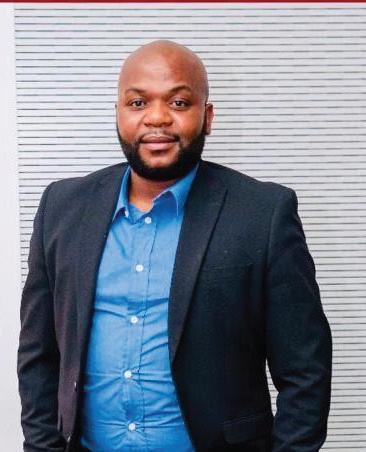
Dr Malema’s future research will adopt an intersectional lens, recognizing the multiple and intersecting forms of marginalization experienced by youth with disabilities. He plans to explore how factors such as gender, race, socioeconomic status, and other intersecting identities influence access to leisure opportunities and the effectiveness of leisure education programs.
In the rapidly evolving digital age, Dr Malema envisions integrating technology and innovative approaches into his future research on leisure education. This may involve developing accessible digital platforms, virtual reality experiences, or assistive technologies that can enhance the delivery and impact of leisure education programs for youth with disabilities.
Dr Malema’s future research agenda will have a strong focus on informing policy decisions and advocating for inclusive leisure and recreation opportunities. By collaborating with policymakers, government agencies, and advocacy organizations, he aims to translate his research findings into actionable policies and initiatives that promote the rights and well-being of youth with disabilities.
Building on his existing partnerships and collaborations, Dr Malema plans to foster international networks and knowledge-sharing platforms in the field of leisure education for people with disabilities. By facilitating the exchange of best practices, research methodologies, and innovative approaches, he hopes to contribute to the global discourse and advancement of inclusive leisure practices. Through his visionary future research plans, he remains steadfast in his commitment to empowering youth with disabilities, reducing inequalities, and fostering sustainable and inclusive communities. His interdisciplinary and collaborative approach, coupled with a drive for innovation and policy impact, positions him as a trailblazer in the field of leisure education.
As a STEM educator, Associate Professor Melanie Luckay conducts research on technological literacy and classroom practice, promoting voice, agency, and intersubjectivity. As the previous teaching practice coordinator, and current HOD of the Educational Studies Department in the Faculty of Education, she collaborates with regional education stakeholders and high-profile scholarly liaisons. Many of these national and international engagements have suggested that socioeconomic factors exert a significant influence on children’s abilities to learn and participate in school activities. Since children spend most of their time in school, it provides an ideal setting for supporting children regardless of their socioeconomic background. Most projects often overlook the interconnectedness of children, parents, teachers or other professionals and do not follow a more integrated approach.

A recent community engagement project, an NRF-funded partnership was established between Sweden and South Africa —an initiative of the South Africa-Sweden University Forum (SASUF) — comprising of a partnership between UWC, UCT (Prof Roshan Galvaan) and Karolinska Institutet and Uppsala University (Sweden). Profs Lisette Farias Vera and Helene Lidström have developed an integrated approach to classroom practice. Activities such as seminars, workshops, publications, and collaborative postgraduate student visits are planned for May 2024. The overall goal of this project is to grow the potential for new partnerships between education students and occupational therapy (OT) students that focus on their role and the value of collaborating in school practice to support children’s learning and participation in schools located in low socioeconomic areas in both Sweden and South Africa. The title of the project is: Partnering to address challenges affecting children’s learning and participation in schools located in low socioeconomic areas – an interdisciplinary and innovative project between occupational therapy and education students in Sweden and South Africa. This interdisciplinary, international and new collaboration will seek to strengthen partnerships, which are very important for developing evidence-based interventions and tools for mainstream schools to support children’s learning and participation through diverse learning activities and research initiatives. The initiative will provide new insights that will assist in creating long-term and effective multidisciplinary techniques for integration into school curricula. As a result, a large number of children will be reached—promoting gender equality (SDG 5); contributing to their wellbeing; and ensuring accessible, inclusive, and equitable learning activities that promote lifelong learning opportunities for all children. Supporting children’s lifelong learning and social participation can lead to better life prospects and eventually, a reduction in inequality (SDG 10), and more inclusive and sustainable cities and communities through capacity-building activities and multi-stakeholder partnerships among schools, researchers, and communities (SDG 17).
Sisa Ngabaza is an Associate Professor and feminist scholar at the University of the Western Cape, South Africa, within the Department of Women’s and Gender Studies. She is also currently the HOD of the department.
Prof Ngabaza has had a long engagement with gender justice issues and much of her work contributes to the SDG goals, including those directed at gender equality (SDG 5), quality education (SDG 4) and good health and wellbeing (SDG 3). Prof Ngabaza completed her PhD in her current department and conducted research about young women who fall pregnant and who become parents at school. Her research highlights the challenges that these young women face with respect to stigma from the school authorities, that undermine their success to complete secondary school.
She has also worked on related projects in interdisciplinary, local and international research teams researching sexuality education and school, and together with Prof Tamara Shefer has recently published a monograph that applies a gender justice lens to the curriculum and teaching. The book also argues the importance of a radical decolonial feminist transformation of pedagogical approaches which centres the young people and their knowledge and experience while also arguing for more participatory, creative methodologies for sexuality education that may contribute to gender justice efforts and empower young women (and men) towards a more equitable, healthy and productive future.
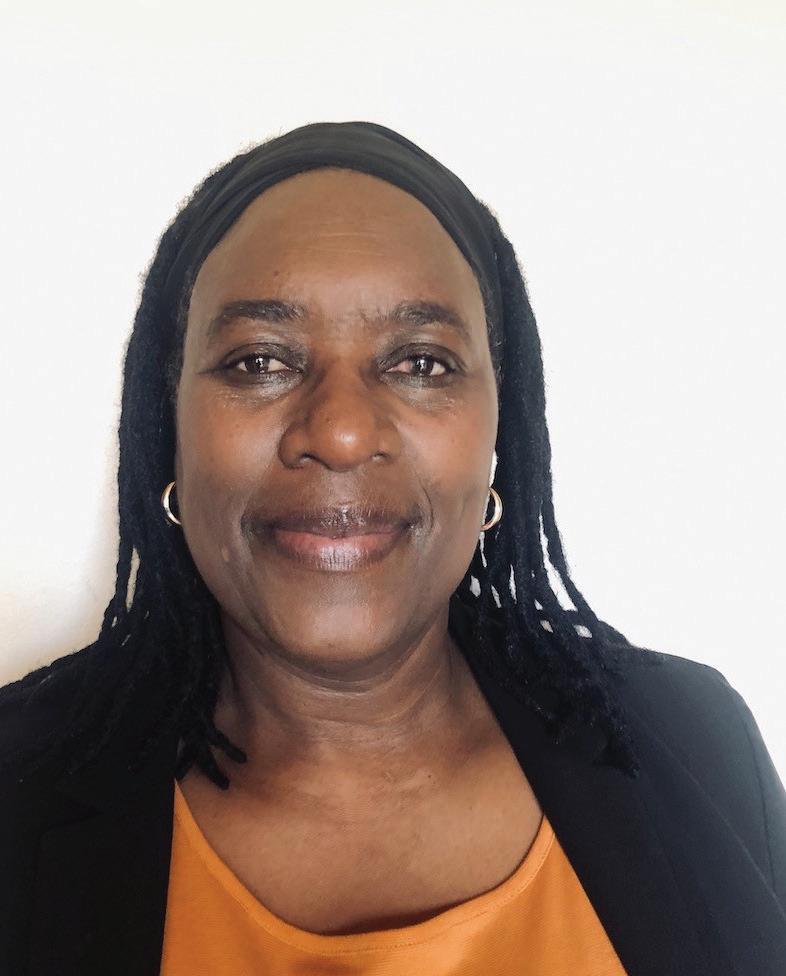
In addition, Prof Ngabaza has worked on “The Call Centre Industry and Young Women’s Participation in the Labour Market”. This work is highly relevant at a time when women’s participation in emerging global markets, facilitated by technology, is becoming increasingly topical. The research questions gender equality in an industry that utilises the labour of young women for global economic gains and growth.
The visibility of this work led to an invitation to contribute to a global research report published by researchers from the United Nations University, Macau (EQUALS Research, United Nations University - Institute on Computing and Society (UNU-CS)).
The research report, a two-part peer-reviewed publication entitled: Taking Stock: Data and Evidence on Gender Equality in Digital Access, Skills and Leadership, was published in March 2019. Prof Ngabaza’s contribution, “Skills development and young women’s work in the call centre industry in South Africa” is included in the second part of the report and is based on this project. The research report highlights the interaction between technology and people in both the global South and North, and part two of the report focuses on three areas, namely technology
and its social context, skills in technology participation, and issues of gender equality in technology. The focus of this work is on gender equality, and the empowerment of young women (SDG 5 of Agenda 2063) which remains a key concern of the academic’s work.
Shefer, T. & Ngabaza, S. (2023). Sexuality education for gender justice in South African contexts: Pitfalls and possibilities. Pretoria: CSA&G Pretoria University.
Ngabaza, S. (2022). Parents resist sexuality education through digital activism. Journal of Education, 89, 84-104.
Ngabaza, S. ( 2019). Skills development and young women’s work in the call centre industry in South Africa. In A. Sey and N. Hafkin (eds). Taking Sock: Data and evidence on gender equality in digital access, skills and leadership. pp. 294-303. Macau. United Nations University.
Ngabaza, & Shefer, T. (2013). Policy commitments vs. lived realities of young pregnant women and mothers in school, Western Cape. Reproductive Health Matters, 21(41), 106-113.
Tamara Shefer is a Senior Professor and feminist scholar at the University of the Western Cape, South Africa, within the Department of Women’s and Gender Studies. She is a NRF B1rated scholar with a long record of research on gender and sexual justice as intersecting with other forms of inequality. Her work contributes to SDG goals, including those directed at gender equality (SDG 5), quality education (SDG 4), as well as good health and wellbeing (SDG 3).
Prof Shefer has primarily directed her work at young people, particularly from the early 1990s when South Africa’s new democracy faced the highly gendered HIV pandemic. Her PhD and later research focused on the intersecting challenges faced by young women around safer sex to prevent HIV infection and for general reproductive health and wellbeing. Her ongoing research includes a focus on the materiality of love and sex, what has been called ‘transactional sex’, young people who fall pregnant becoming parents at school, and a feminist critique of sexuality education (including a recent book with Prof Ngabaza). She also went on to conduct research with regard to boys, men and masculinities as critical to gender justice efforts and co-edited an early volume in 2007 with renowned critical masculinity scholar Kopano Ratele among others, and more recently, was co-editor of the International Handbook on Masculinity Studies.
Over the last decade Prof Shefer’s work has generated a more critical perspective of mainstream research and pedagogical practices directed at young people to which she has applied a decolonial feminist analysis. Her research has contributed to a growing critique of dominant approaches to young people in South Africa
and elsewhere which have reproduced and reentrenched gender binaries and stereotypes, heteronormativity and homophobia, as well as ageist, racist and classist tropes (see Shefer & Hearn, 2022).
Such a critique has also opened up Prof Shefer’s current emphasis on alternative, decolonial feminist praxis in teaching and research, which has been a part of a 5-year A.W. Mellon funded projects, namely New Imaginaries for Gender and Sexual Justice, for which she acted as PI. This project showcases radical alternative and creative ways of making and sharing knowledge,
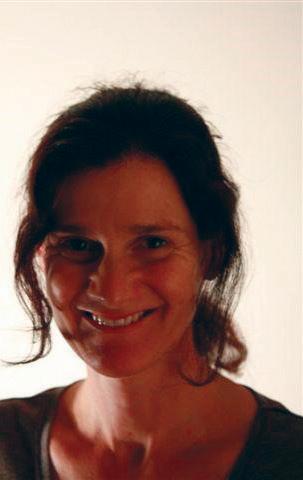
years in her faculty and has co-edited books and published articles on social justice pedagogies. She is currently working on projects related to thinking with oceans and bodies of water towards alternative knowledge that are directed towards justice and she challenges continued colonial, patriarchal and capitalist engagements that are damaging and undermining the wellbeing of many communities, other species and the planet in general. Prof Shefer has a long international collaboration having taught and researched in many geopolitical contexts with emphasis on transnational feminist praxis, including being the co-chair of an international gender association (RINGS) for some years. She is currently leading a work package on media and representation as part of an EU Horizon 3-year project, Realising Girls’ and Women’s Inclusion, Representation and Empowerment (Re-Wiring).
Selected publications:
Shefer, T., Bozalek, V. & Romano, N. (2024). Hydrofeminist thinking with oceans: Political and scholarly possibilities. London: Routledge.
Shefer, T. & Ngabaza, S. (2023). A feminist critique of sexuality education for gender justice in South African contexts. Pretoria: CSA&G Pretoria University.
Shefer, T. & Hearn, J. (2022). Knowledge, power and young sexualities: A feminist transnational engagement. London: Routledge.
Gottzén, L., Mellström, U., and Shefer, T. (Eds.) (2020). The International Handbook of Masculinity Studies. London: Routledge.
Shefer, T., Hearn, J., Ratele, K. & Boonzaier, F. (Eds) (2018). Engaging Youth in Activism, Research and Pedagogical Praxis: Transnational and Intersectional Perspectives on Gender, Sex, and Race. New York: Routledge.
The aim of the chair is to engage with the role that law and jurisprudence can play to respond to the endurance of inequality on many levels. In this regard, the chair relates to the aims and spirit of the SDGs, in particular to strive for transformation of present systems and structures and the building of more just, equal and caring worlds.
Within the context of the university, the most direct impact and community engagement concern the student community. Firstly, the curriculum, in the case of the chair, the law curriculum, should underscore the needs of the societies and communities that we serve. What we teach but also how we teach should beckon students to think for themselves, to read, interpret and evaluate texts in a critical manner and to translate these thoughts in well written arguments. Secondly, institutional culture and the world of the university/faculty should not only transform continuously, but also support students’ self-transformation. The chair supports student life by presenting seminars that provide opportunities for student engagement with texts, ideas, and academics in safe and communal spaces. This year the chair hosted a feminist reading group (‘Calling all feminists’) with the aim of building capacity
in feminist and gender theory.
On 21 February, the chair hosted a public seminar presented by Prof Stephen Clingman at the Iyatsiba lab in Greatmore Street in Woodstock in which he reflected on how meaning is created by boundaries and how identities as boundaries should be understood as being relational and interactive. Making sense of boundaries and identities is crucial to obtain a deeper understanding and transformation of structural inequality and social injustice.
In a book chapter, ‘Democracy and the City’ in The D-word: Perspectives on Democracy in Tumultuous Times (in Van der Westhuizen, Dube and Jolobe (2023), Prof Karin van Marle

reflects on if and how the city as metaphor for democracy can be a space where women can pursue the ideals of freedom but also experience equality and social justice. In light of two art works, the one a painting by Nicholas Poussin; the other an artwork by Asanda Kaka and Valentina Argiró, Prof Van Marle also reflects on how women may claim the right to the city for themselves. Feminist spatial theorists have argued that Henri Lefevbre, who coined the idea of the right to the city, did not necessarily have women’s specific experience and needs in mind. The ways in which women use and can make use of space differs because of safety and the fear of violence but also because often they carry a heavier caring burden than men which influences when and how they can access public
space. Together with gender, race and culture also influence the enjoyment of space.
In addition, contemplating on feminist writing about the home and debates between those who identify the home solely with traditional roles and subordination and those who argue that the home for some, if not many women, also provides a space of resistance and politics. Drawing on Clingman’s insights, the boundary between public and private should be understood as relational and dynamic, not static. With the elections looming, women’s access to and experience of both private and public spaces are important to support their role as active citizens and by being active citizens participating in the building and re-building of different worlds.
As oral health advances further into the 21st century, dental science research is making remarkable progress. Notable strides in pathobiology, regenerative medicine, bioengineering, and personalised medicine are reshaping the landscape of dentistry which has the potential of delivering improved dental care and heralding a distinct transformation in the field.
It has been recognised that the future of evidencebased dentistry in developing South Africa and Africa heavily depends on a sustainable establishment of a vibrant dentist-scientist workforce.

A dentist-scientist is a person who studies dental and craniofacial diseases, with a responsibility to conduct research on biomedical mechanisms, the genetics and genomics of a disease with the view to improved management of affected persons.
A postgraduate programme (MSc and PhD) in Craniofacial Science is currently being developed (in collaboration with Kings College in London which will encourage research into the molecular etiology of rare diseases and non-communicable oral health conditions. In order to further strengthen the UWC dentistry clinical research programme and scale this idea nationally, one model that comes to mind is the successful DSI/NRF Nanotechnology programme across multiple higher education institutions. Similarly, a programme that straddles UWC, Wits, UKZN and UP is being conceptualised.
Research capacity development is a core focus of the research chair project and it is envisaged that dental clinicians will be trained to have expertise in various niche areas, such as clinical human genetics, laboratory sciencesparticularly molecular biology in terms of oral cancer and other oral non-communicable diseases, teaching and learning, and research methods. These dentist-scientists will be pioneers in the field in South Africa and will be responsible for training future undergraduate and postgraduate students. Research priorities have been identified, and projects have been developed within these priority areas designed to train clinician-scientists as experts in their field. This exposure will facilitate and nurture both local and international collaboration.
A dental-genetics clinic has been formalised at
the Faculty of Dentistry (UWC) which manages the craniofacial problems of patients with inherited disorders and rare diseases.
An in-house oral oncology clinic has also been established which serves as a referral base for oncology patients to be managed prior and post therapy.
Support provided by the research chair enabled the formalisation of the African Society of Dental and Craniofacial Genetics (ASDCG) affiliated to the African Society of Human Genetics with the vision to unite dentists and clinicians in a shared mission to elevate genetics and genomics research within the field of dentistry. The vision of the ASDCG is to raise the awareness of the vital role dentists play in identifying genetic conditions with oral and craniofacial impact. These initiatives encourage the need for national, international and multidisciplinary engagement.
The following projects are currently in progress in this niche area:
- Exsosomal microRNA signature as a diagnostic biomarker for oral squamous cell carcinoma.
This project will serve as a catalyst for the initiation and development of an in-house Head and Neck Cancer Registry and biobank.
- Exsosomal microRNA signature and cellfree DNA as diagnostic biomarkers for oral squamous cell carcinoma: A Sub-Saharan Africa Multicentre Study
- Characterisation of the oral microbiome and associated neutrophil function in periodontitis in a Western Cape population



From the heart of Uitsig, Ravensmead, Tamzon Moses emerges as a beacon of resilience and determination, shaped by her upbringing. As a bold Pan-Africanist, she embarks on a relentless pursuit of academic excellence, culminating in the distinction earned for her ground-breaking final year paper, “Mahlangu and Another v Minister of Labour and Others [2020] ZACC 24: The Distinction Between Social Assistance and Social Insurance in South Africa.” This paper stands not just as an academic achievement but as a manifesto for change, envisioning the radical transformation of the Social Grant system into a vehicle for empowering marginalized communities.
Having served as a student assistant at the law faculty office, Moses seamlessly intertwines academic brilliance with unwavering community service. From commanding the highest votes as a final-year LSC candidate to ascending to presidential candidacy for the PASMA-

Led SRC, her dedication to representation is unparalleled.
As the visionary founder of the Student Solidarity Coalition, Moses ignites a fire within students, uniting them for collective action and compelling us all to stand for a society founded on justice and equity.
Moses transcends the mere title of leader; she is a forceful activist, unyielding in her pursuit of social and political justice. As an intersectional feminist and survivor who staunchly revolts against Gender-Based Violence, she confronts systemic oppression head-on, inspiring all who stand alongside her to join in the fight for a just and equitable present. Her mission? To return political power to the people, empowering communities and shaping a future where justice reigns supreme.
Have you ever felt the weight of societal expectations and limitations because of your gender? Do you carry the burden of generational trauma passed down through stories of oppression and resilience? Do you believe that everyone, regardless of gender, should have the same rights and opportunities? In essence, it’s crucial to acknowledge that beneath South Africa’s epithet as the “Rainbow Nation”, profound intersectional inequalities persist. From the humble beginnings in schools to the pinnacle of higher education, race, class, and gender disparities intertwine, casting a shadow over our society’s advancement.
Our fight surpasses the outdated notion of men versus women. It unites men, women, and nonbinary individuals against a common enemy: the interconnected structures of classism, racism,
sexism, and homophobia. These interwoven systems cannot be tackled in isolation; they are the very roots of normalised injustices perpetuating gender inequity and injustice. By demanding radical transformation, we centre the voices of marginalised women and those directly impacted. As Angela Davis aptly reminds us, we must advocate for abolition – of carceral systems that disproportionately target marginalised communities – and of the very concept of capitalism that prioritises profit over people, fuelling global poverty and resource exploitation.
We are standing alongside the trailblazing women who paved the way, as well as countless others who persist in combating the systemic gender inequalities that plague our society. We are in fact witnessing the dawn of a new era, where African women are assuming leadership positions and challenging the traditional maledominated narrative. This is unmistakably the era of women—women who have historically been marginalised and oppressed, including poor women, Black women, Muslim women, indigenous women, queer women, and trans women. As these individuals rise, so too does the entire world.
Founded in August 2023, the Student Solidarity Coalition (SSC) at the University of the Western
Cape remains steadfast in its mission to ignite change through education, empowerment, and action. Guided by the Gender Equity Unit (GEU), we make it our core mission to confront social, political, and academic issues within and beyond the university’s borders. While acknowledging the widespread dissatisfaction with the United Nations, particularly concerning Sustainable Development Goals (SDGs) 5 (Gender Equality) and 10 (Reduced Inequalities), we simply value the principles outlined in these goals and strive to translate them into tangible reality.
Our determination is fuelled not by mere hope, but by the searing blaze of revolutionary indignation. Revolution not as metaphor, but in praxis. Our rage targets the systems of oppression that still maintain structural patriarchy, settler colonialism, state violence, and genocide. These systems, in our outlook, are intersectional; none functions without the others. These injustices are still present in the Democratic Republic of Congo, Ethiopia, Uganda, Sudan, Haiti, South Africa, as well as in countries like Australia, Palestine, Canada, Russia, Ukraine and the United States.
As Africans, we inherently embody intersectional feminism, a force that demands a future where justice isn’t a privilege, but a birth right.
There is global recognition of the need to address systemic inequalities that hinder progress towards sustainable development. Sustainable Development Goal 10 aims to reduce inequalities within and among countries. To achieve this goal, the IWAAC-10 project, funded by DAAD, has brought together researchers from Germany, South Africa and Malaysia. The project aims to develop a research-based curriculum on social inequalities, facilitate exchanges between partner universities, and establish a transnational research network.
Maria van Staden’s contribution to this project focuses primarily on girl-child issues and the provision of non-formal education opportunities, which are closely aligned with Sustainable Development Goal 10.3. Ensuring equal opportunities and ending discrimination, especially for marginalised girls, are an essential aspect of this research.
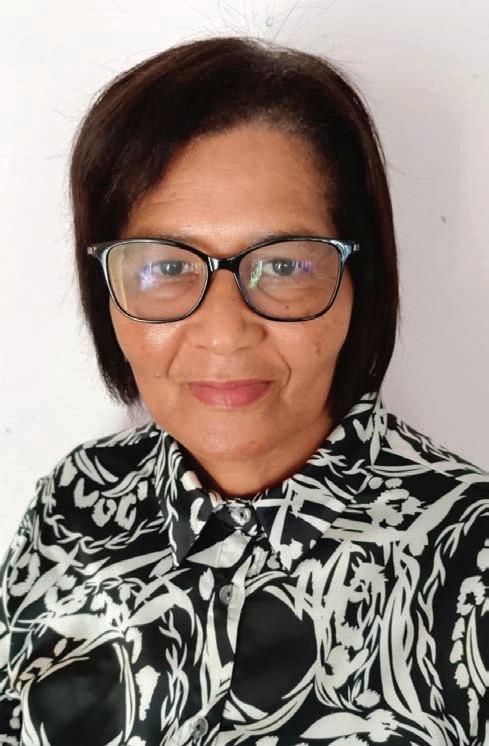
Through this study, non-formal education is explored as an extension of the formal education system that can equip girls with the
necessary skills to overcome contextual marginalisation.
Gender inequality, along with other social inequalities, has a profound impact on the lives of young girls, especially those from disadvantaged backgrounds. The existence of social inequality based on poverty, race, ethnicity, and disability status has led to additional barriers for young girls who have multiple marginalised identities. This often reinforces their marginalisation, making their situation even more challenging. According to UNFPA and UNICEF (2009), these young girls face compounded obstacles that exacerbate their difficulties.
Whilst there is evidence that girls have access to the formal educational system in the Western Cape, South Africa, it appears that females have yet to benefit equally (Nomlomo, 2013). Young girls in farming communities still face significant challenges that hinder their ability to receive a high school education and pursue higher education opportunities.
For two residential weekends, workshops were held with girls residing on farms and in rural areas of the Western Cape. Additionally, mentors were trained to provide support within the farming community. This programme aimed to equip young girls and women living in rural areas and on farms with essential life skills to address the high rate of school dropouts, enhance sexual health, and prevent alcohol and drug abuse. It also covered a range of topics, including self-esteem, gender-based violence awareness, conflict management, substance abuse awareness, financial literacy, sexual health, and career guidance. Employing a feminist pedagogical approach presented key opportunities to critically analyse societal structures, centre and amplify marginalised voices, leadership development and resilience building, promote agency and build solidarity.
The study has revealed that non-formal education can equip girls with practical and real-world skills to help them overcome poverty, lack of opportunities, and other barriers in their local contexts. Non-formal education programmes aim to bridge the critical gaps left by mainstream education systems that have failed to provide sufficient support to marginalised girls due to
various factors, such as lack of access, quality, and relevance. These programmes can be tailored to address the unique needs of vulnerable girls that are not being well-served by the formal system. As a result, non-formal education can serve as a constructive and effective means of promoting gender equality and empowering girls in disadvantaged situations.

Gender equality is not only a fundamental human right, but a necessary foundation for a peaceful, prosperous and sustainable world. There has been progress over the last decades, but the world is not on track to achieve gender equality by 2030.
Women and girls represent half of the world’s population and therefore also half of its potential. But gender inequality persists everywhere and stagnates social progress. On average, women in the labor market still earn 23 percent less than men globally and women spend about three times as many hours in unpaid domestic and care work as men.
Sexual violence and exploitation, the unequal division of unpaid care and domestic work, and discrimination in public office, all remain huge barriers. All these areas of inequality have been exacerbated by the COVID-19 pandemic: there has been a surge in reports of sexual violence, women have taken on more care work due to school closures, and 70% of health and social workers globally are women.
At the current rate, it will take an estimated 300 years to end child marriage, 286 years to close gaps in legal protection and remove discriminatory laws, 140 years for women to be represented equally in positions of power and leadership in the workplace, and 47 years to achieve equal representation in national parliaments.
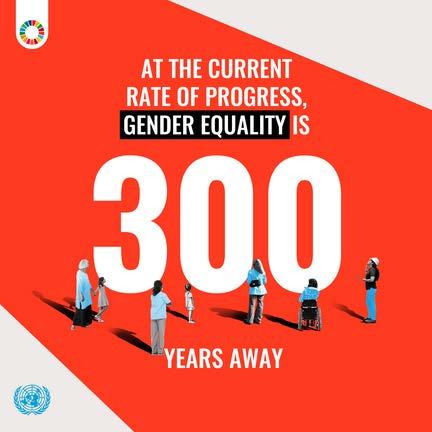
Political leadership, investments and comprehensive policy reforms are needed to dismantle systemic barriers to achieving Goal 5. Gender equality is a cross-cutting objective and must be a key focus of national policies, budgets and institutions.
International commitments to advance gender equality have brought about improvements in some areas: child marriage and female genital mutilation (FGM) have declined in recent years, and women’s representation in the political arena is higher than ever before. But the promise of a world in which every woman and girl enjoys full gender equality, and where all legal, social and economic barriers to their empowerment have been removed, remains unfulfilled. In fact, that goal is probably even more distant than before, since women and girls are being hit hard by the COVID-19 pandemic.

Yes. Worldwide, nearly half of married women lack decision-making power over their sexual and reproductive health and rights. 35 per cent of women between 15-49 years of age have experienced physical and/ or sexual intimate partner violence or non-partner sexual violence.1 in 3 girls aged 15-19 have experienced some form of female genital mutilation/cutting in the 30 countries in Africa and the Middle East, where the harmful practice is most common with a high risk of prolonged bleeding, infection (including HIV), childbirth complications, infertility and death.
This type of violence doesn't just harm individual women and girls; it also undermines their overall quality of life and hinders their active involvement in society.
Regardless of where you live in, gender equality is a fundamental human right. Advancing gender equality is critical to all areas of a healthy society, from reducing poverty to promoting the health, education, protection and the well-being of girls and boys.
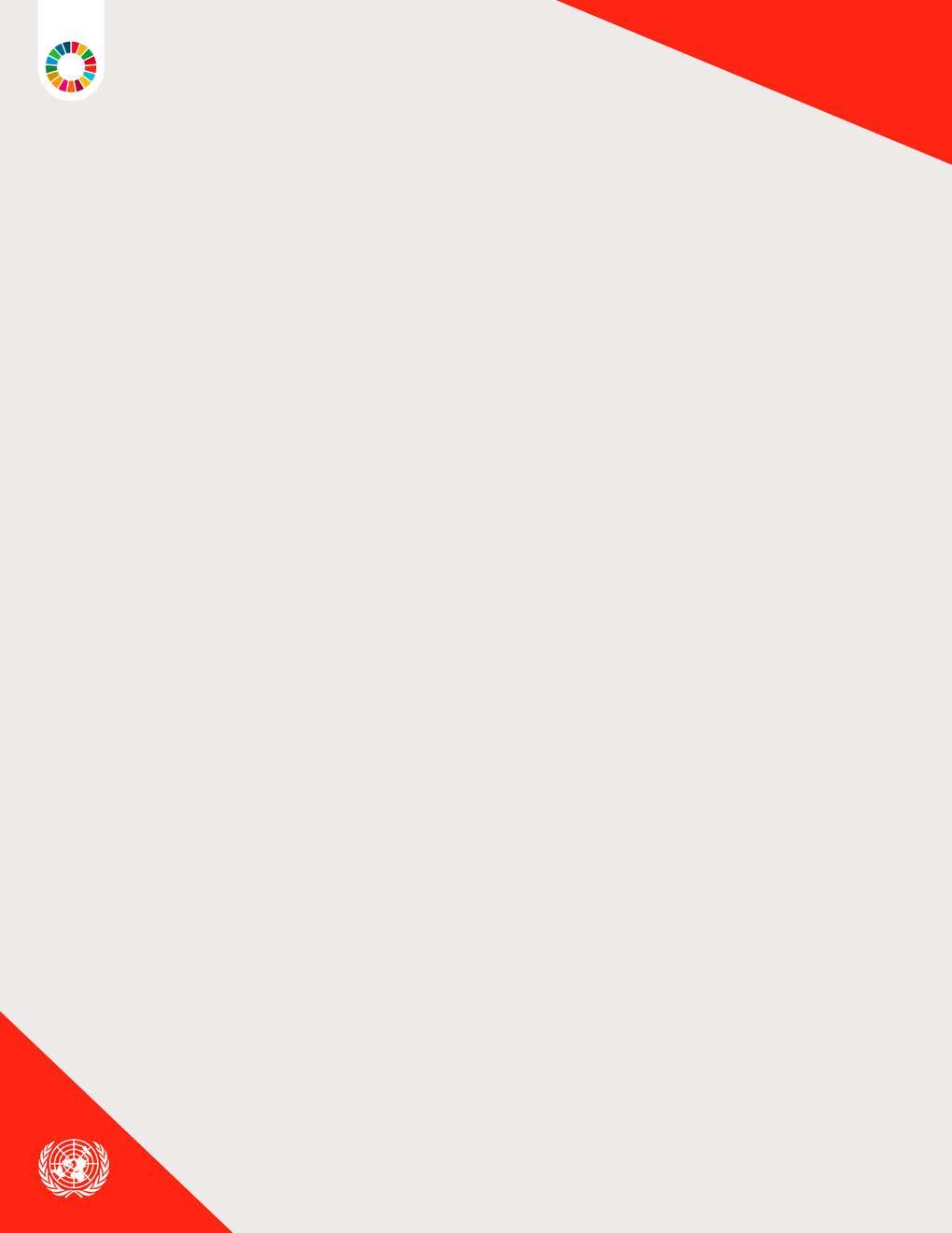
If you are a girl, you can stay in school, help empower your female classmates to do the same and fight for your right to access sexual and reproductive health services. If you are a woman, you can address unconscious biases and implicit associations that form an unintended and often an invisible barrier to equal opportunity.
If you are a man or a boy, you can work alongside women and girls to achieve gender equality and embrace healthy, respectful relationships.
You can fund education campaigns to curb cultural practices like female genital mutilation and change harmful laws that limit the rights of women and girls and prevent them from achieving their full potential.
The Spotlight Initiative is an EU/UN partnership, and a global, multi-year initiative focused on eliminating all forms of violence against women and girls – the world’s largest targeted effort to end all forms of violence against women and girls..
To find out more about Goal #5 and other Sustainable Development Goals, visit: https://www.un.org/sustainabledevelopment
The world is
At the current rate, it will take
300 years to end child marriage
286 years to close gaps in legal protection and remove discriminatory laws
Legislated gender quotas are effective to achieve equality in politics
(2022)
“on track” at a moderate distance far or very far off TRACK
140 years to achieve equal representation in leadership in the workplace
1 in 5 young women
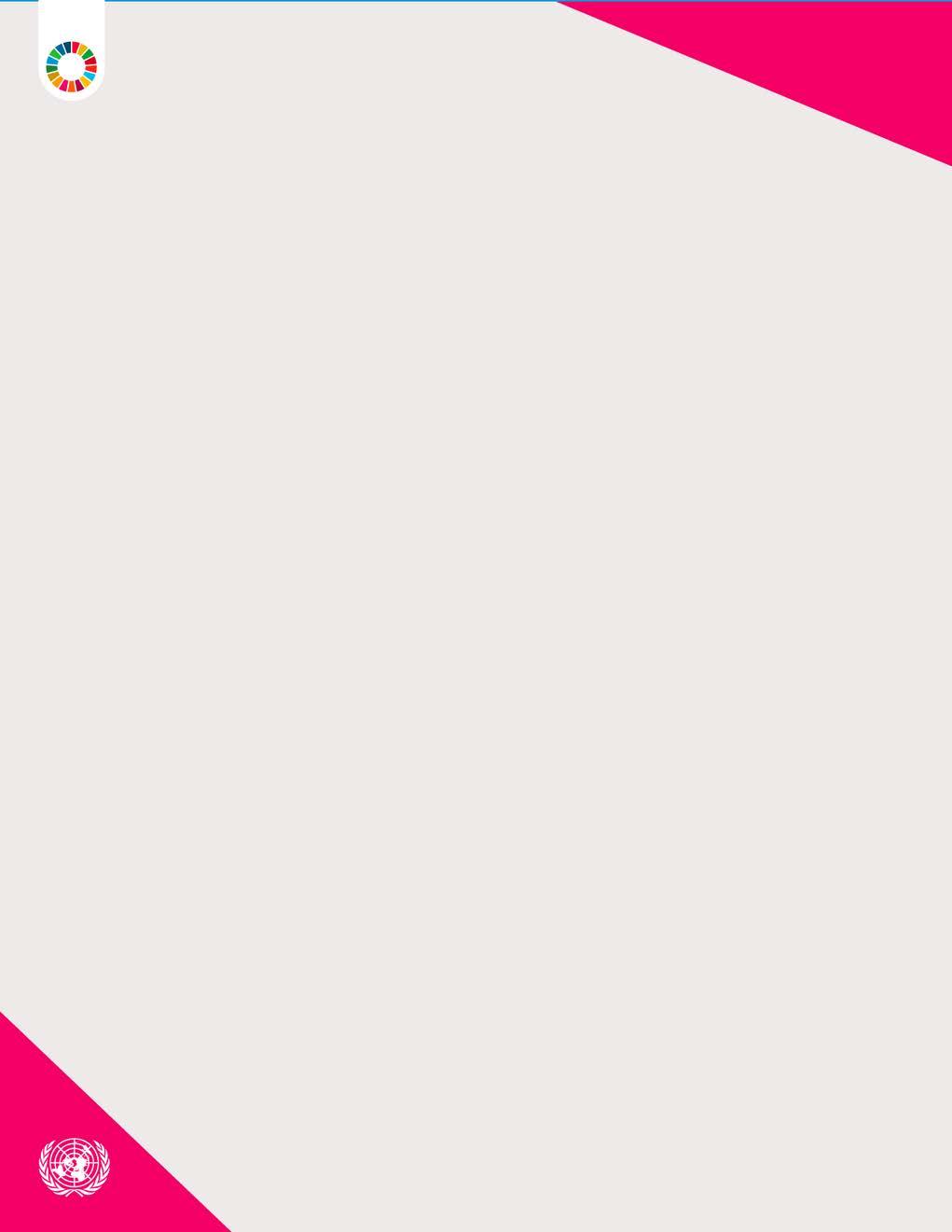
Inequality threatens long-term social and economic development, harms poverty reduction and destroys people’s sense of fulfillment and self-worth.
The incomes of the poorest 40 per cent of the population had been growing faster than the national average in most countries. But emerging yet inconclusive evidence suggests that COVID-19 may have put a dent in this positive trend of falling within-country inequality.
The pandemic has caused the largest rise in between-country inequality in three decades. Reducing both within- and between-country inequality requires equitable resource distribution, investing in education and skills development, implementing social protection measures, combating discrimination, supporting marginalized groups and fostering international cooperation for fair trade and financial systems.
Inequalities based on income, sex, age, disability, sexual orientation, race, class, ethnicity, religion and opportunity continue to persist across the world. Inequality threatens long-term social and economic development, harms poverty reduction and destroys people’s sense of fulfillment and self-worth. This, in turn, can breed crime, disease and environmental degradation.
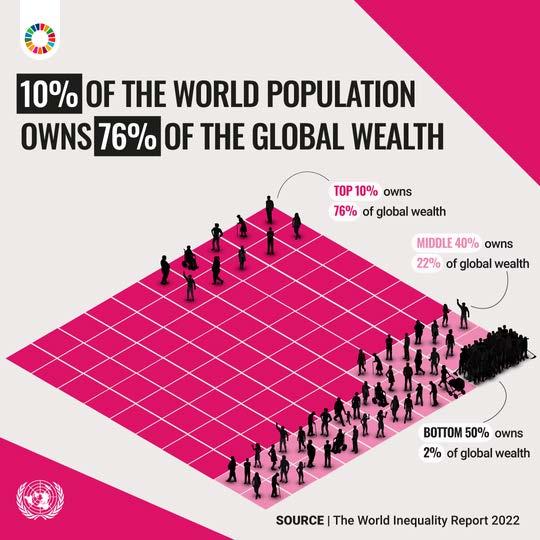
We cannot achieve sustainable development and make the planet better for all if people are excluded from the chance for a better life.
Women and children with lack of access to healthcare die each day from preventable
diseases such as measles and tuberculosis or in childbirth. Older persons, migrants and refugees face lack of opportunities and discrimination – an issue that affects every country in the world. One in five persons reported being discriminated on at least one ground of discrimination prohibited by international human rights law.
One in six people worldwide has experienced discrimination in some form, with women
and people with disabilities disproportionately affected.
Discrimination has many intersecting forms, from from religion, ethnicity to gender and sexual preference, pointing to the urgent need for measures to tackle any kind of discriminatory practices and hate speech.
In today’s world, we are all interconnected. Problems and challenges like poverty, climate change, migration or economic crises are never just confined to one country or region. Even the richest countries still have communities living in abject poverty. The oldest democracies still wrestle with racism, homophobia and transphobia, and religious intolerance. Global inequality affects us all, no matter who we are or where we are from.
It can – and should be – achieved to ensure a life of dignity for all. Political, economic and social policies need to be universal and pay particular attention to the needs of disadvantaged and marginalized communities.

Reducing inequality requires transformative change. Greater efforts are needed to eradicate extreme poverty and hunger, and invest more in health, education, social protection and decent jobs especially for young people, migrants and refugees and other vulnerable communities.
Within countries, it is important to empower and promote inclusive social and economic growth. We can ensure equal opportunity and reduce inequalities of income if we eliminate discriminatory laws, policies and practices.
Among countries, we need to ensure that developing countries are better represented in decision-making on global issues so that solutions can be more effective, credible and accountable.
Governments and other stakeholders can also promote safe, regular and responsible migration, including through planned and wellmanaged policies, for the millions of people who have left their homes seeking better lives due to war, discrimination, poverty, lack of opportunity and other drivers of migration.
To find out more about Goal #10 and the other Sustainable Development Goals, visit: https://www.un.org/ sustainabledevelopment
COVID-19 triggers the largest increase in between-country inequality in three decades ,
CHANGE OF Between-country inequality (2019-2020)
4.4% -0.8%
Pre-Pandemic Forecast
reversing decades of income convergence
In 2022, refugee numbers hit a record high of 34.6 million
Among them were:
Children: 41%
The income differences between countries decreased by 37% between 1990 and 2019
Globally, Women are twice as likely as men to report experiencing discrimination based on their sex
The tragic loss of nearly 7,000 lives along migratory routes in 2022
underscores the pressing need for immediate action to ensure safe migration
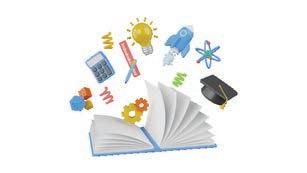
Your story matters!
Share your postgraduate journey with us, to share with others.
Contact: Tamara Goliath (tgoliath@uwc.ac.za) Writer, DVC: Research & Innovation office
Join us on the DVC: Research & Innovation Social Media platform pages for the latest information on upcoming webinars and more. #MakingResearchCount
UWC Research & Innovation @UwcResearch

